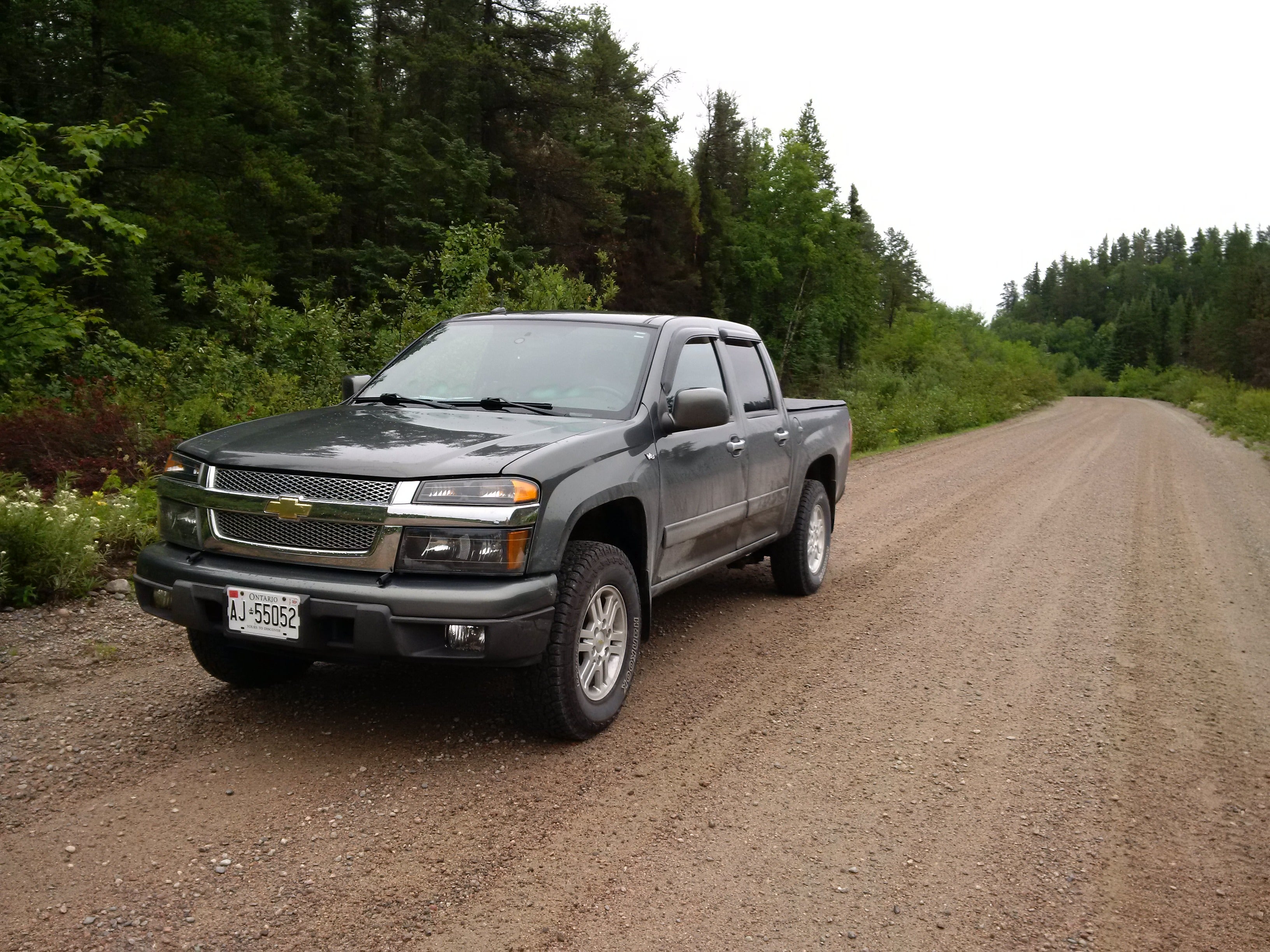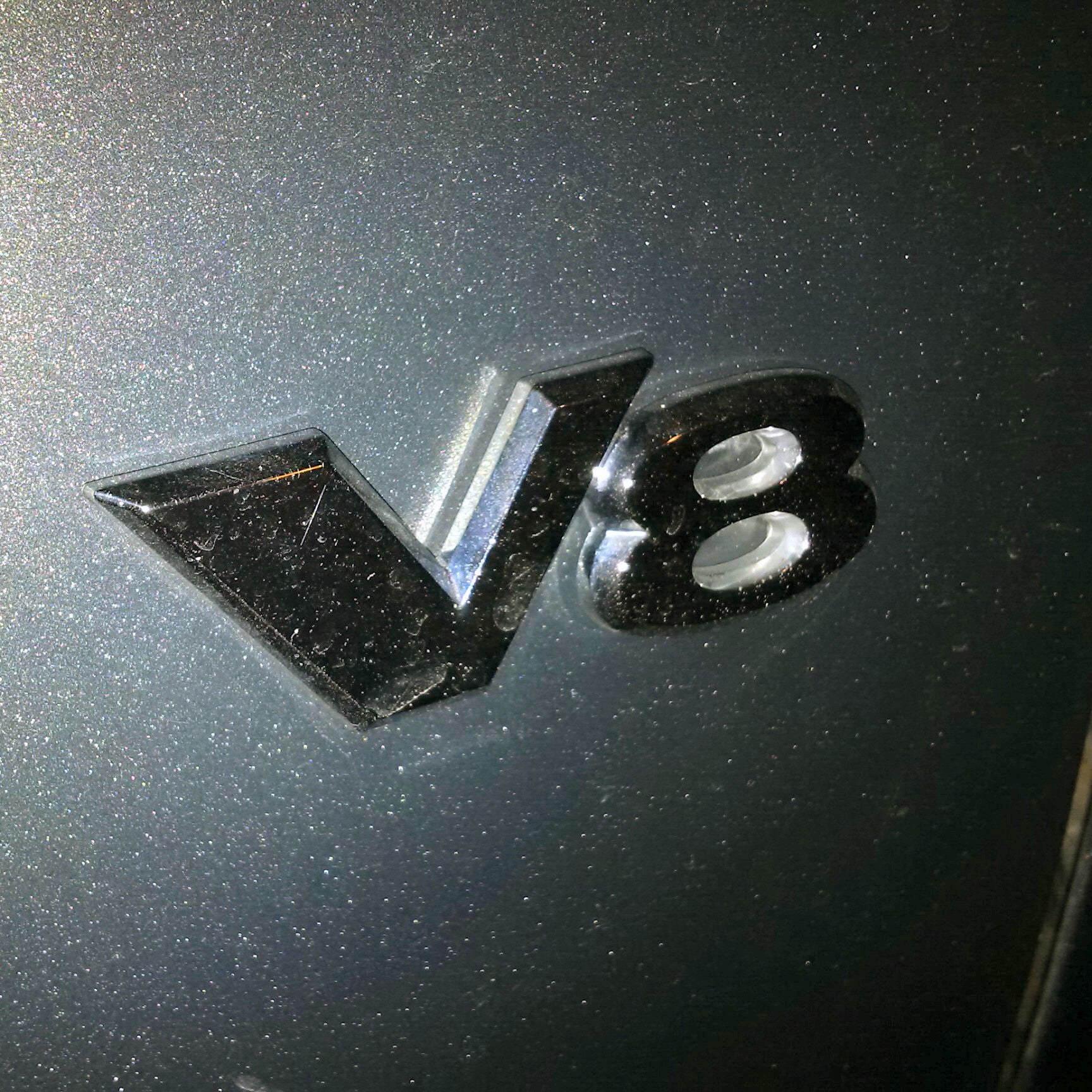 "Smallbear wants a modern Syclone, local Maple Leafs spammer" (smallbear94)
"Smallbear wants a modern Syclone, local Maple Leafs spammer" (smallbear94)
08/31/2016 at 15:21 • Filed to: None
 2
2
 16
16
 "Smallbear wants a modern Syclone, local Maple Leafs spammer" (smallbear94)
"Smallbear wants a modern Syclone, local Maple Leafs spammer" (smallbear94)
08/31/2016 at 15:21 • Filed to: None |  2 2
|  16 16 |
This thing,

with a 5.3L V8,

and a full load of people and luggage, managed to hit:

and to average

For those of you who don’t understand L/100KM, that’s a “best” of 25.33MPG (Imperial) and an average of ~24.75MPG.
And this was on a 24h (OK, 25 1/2 one way, but that was on the way back when we took a route that was an hour and a half longer) trip Google said was 26h. I am quite content.
 MoFinWiley
> Smallbear wants a modern Syclone, local Maple Leafs spammer
MoFinWiley
> Smallbear wants a modern Syclone, local Maple Leafs spammer
08/31/2016 at 15:27 |
|
Pushrods FTW!
 Smallbear wants a modern Syclone, local Maple Leafs spammer
> MoFinWiley
Smallbear wants a modern Syclone, local Maple Leafs spammer
> MoFinWiley
08/31/2016 at 15:27 |
|
Damn straight.
 RamblinRover Luxury-Yacht
> Smallbear wants a modern Syclone, local Maple Leafs spammer
RamblinRover Luxury-Yacht
> Smallbear wants a modern Syclone, local Maple Leafs spammer
08/31/2016 at 15:31 |
|
Yes, they are.
IT’S FUNNY BECAUSE IF THEY WERE BENT THERE WOULD BE A PROBLEM
 MontegoMan562 is a Capri RS Owner
> Smallbear wants a modern Syclone, local Maple Leafs spammer
MontegoMan562 is a Capri RS Owner
> Smallbear wants a modern Syclone, local Maple Leafs spammer
08/31/2016 at 15:33 |
|
That is one HELL of an average/best rating.
My Milan gets a best of ~30 (rated to 26 hwy) and I probably average about 23 with a V6 in a mid size FWD.
I clearly should’ve bought a V8 Colorado.
 Smallbear wants a modern Syclone, local Maple Leafs spammer
> RamblinRover Luxury-Yacht
Smallbear wants a modern Syclone, local Maple Leafs spammer
> RamblinRover Luxury-Yacht
08/31/2016 at 15:38 |
|
Yeah, but to bend them needs 27 pounds of boost
http://www.trucktrend.com/how-to/engine/…
OK, fine, fine, there are other ways...
 Milky
> Smallbear wants a modern Syclone, local Maple Leafs spammer
Milky
> Smallbear wants a modern Syclone, local Maple Leafs spammer
08/31/2016 at 15:42 |
|
L/100km is stupid, but that is damn good.
My car is a lot lighter and has a smaller engine, yet gets that mileage (average 24). I should try to max out my mileage once in the thing, or at least keep it below 80mph.
 Smallbear wants a modern Syclone, local Maple Leafs spammer
> MontegoMan562 is a Capri RS Owner
Smallbear wants a modern Syclone, local Maple Leafs spammer
> MontegoMan562 is a Capri RS Owner
08/31/2016 at 15:42 |
|
This is all highway. It’s from my trip a couple weeks ago. I think my overall average before the trip was about 18MPG.
Also, these are Imperial MPG,so this would be 20-21 for you.
Still, I had a full load, 25 is respectable hwy for ANY truck under ANY conditions, and I definitely didn’t buy it for the gas mileage. I am content.
 Smallbear wants a modern Syclone, local Maple Leafs spammer
> Milky
Smallbear wants a modern Syclone, local Maple Leafs spammer
> Milky
08/31/2016 at 15:50 |
|
L/100km is actually quite smart. It’s very easy to get a per/km cost from, among other things. But, like millimeters, it’s just not as easy to use every day as MPG or inches.
This is imperial MPG, too. about 20-21 for you. Still pretty damn good if I say so myself... Here’s something interesting for you though. That best tank, about a little under 3/8 (so really ~1/4 because the last quarter on the gauge is not really a quarter) wasn’t looking too hot. It was the middle of the night in the middle of nowhere, and because the nearest gas station was still ~140km away I advised the current driver to slow down a little. He kept it between 80-90km/h from the 100-110 we’d been averaging, and ended up getting the best tank yet. From kinda meh to best tank in 140km... you do the math.
If I had the patience I’d just go cruise one tank out just to see what it can really do...
 Nonster
> Smallbear wants a modern Syclone, local Maple Leafs spammer
Nonster
> Smallbear wants a modern Syclone, local Maple Leafs spammer
08/31/2016 at 15:57 |
|
I really want one of those V8 colorados. Do I need the 5.3? no but its such a great motor.
 Smallbear wants a modern Syclone, local Maple Leafs spammer
> Nonster
Smallbear wants a modern Syclone, local Maple Leafs spammer
> Nonster
08/31/2016 at 15:59 |
|
Agreed. If they’d just paired it with the manual it would be rediculous fun. As it is it’s still fun, but you know there’s a time bomb in the tranny tunnel...
 Probenja
> Smallbear wants a modern Syclone, local Maple Leafs spammer
Probenja
> Smallbear wants a modern Syclone, local Maple Leafs spammer
08/31/2016 at 16:01 |
|
I mean... km/l is used in many countries too and it’s really easy to use and straight foward, I can’t stand the l/100km thing as it’s the opposite to mpg or km/l where the higher the number the better it is.
 Smallbear wants a modern Syclone, local Maple Leafs spammer
> Probenja
Smallbear wants a modern Syclone, local Maple Leafs spammer
> Probenja
08/31/2016 at 16:04 |
|
I think the reason KM/L doesn’t get used here is because it works the same way as MPG but gives really small numbers. Better to use something entirely new that can’t be easily related back to an old system.
Also, think about what I said for calculating cost per km. With L/100km, I go 11.15/100km->0.115/1km->0.115/1.087$->0.1057$/km. With KM/L, You have an extra step. With L/100km you’re already partway through the process.
 BigBlock440
> RamblinRover Luxury-Yacht
BigBlock440
> RamblinRover Luxury-Yacht
08/31/2016 at 16:20 |
|
Even better, if they’re the intake push rods, you’ll get better mpg.
 MontegoMan562 is a Capri RS Owner
> Smallbear wants a modern Syclone, local Maple Leafs spammer
MontegoMan562 is a Capri RS Owner
> Smallbear wants a modern Syclone, local Maple Leafs spammer
08/31/2016 at 16:22 |
|
It would have been worth the minor loss in economy I think.
 Smallbear wants a modern Syclone, local Maple Leafs spammer
> MontegoMan562 is a Capri RS Owner
Smallbear wants a modern Syclone, local Maple Leafs spammer
> MontegoMan562 is a Capri RS Owner
08/31/2016 at 16:26 |
|
Fair enough :)
 bhtooefr
> Probenja
bhtooefr
> Probenja
08/31/2016 at 16:38 |
|
The problem with both MPG and km/l is that they overemphasize small improvements in fuel efficiency in an already efficient car, and underemphasize large improvements in fuel efficiency in an inefficient car. And, you don’t drive x gallons or x liters, you drive x miles or x kilometers.
Quick quiz: which is a bigger improvement, going from 18 to 20 MPG, or going from 40 to 50 MPG?
18 to 20 is “only” a 2 MPG increase, whereas 40 to 50 is an impressive 10 MPG increase, right? And, if you look at it as percentage, 18 to 20 is uses 10% less fuel, whereas 40 to 50 uses 20% less fuel, right?
Wrong.
If you drive an 18 MPG vehicle 100 miles, you’ll have burned 5.56 gallons. Drive the 20 MPG vehicle 100 miles, you’ll have burned 5 gallons - 0.56 less gallons.
Drive the 40 MPG vehicle 100 miles, and you’ll have burned 2.5 gallons. Drive the 50 MPG vehicle 100 miles, and you’ll have burned 2 gallons - 0.5 less gallons.
A lot of people see pickups where a huge efficiency improvement “only” gets 1 or 2 MPG better, and they decide it’s not worth it... but inefficient vehicles are where 1 or 2 MPG counts for a lot more than it seems.
Conversely, in a fuel over distance measurement, efficiency improvements are exactly represented by the amount of fuel they save.